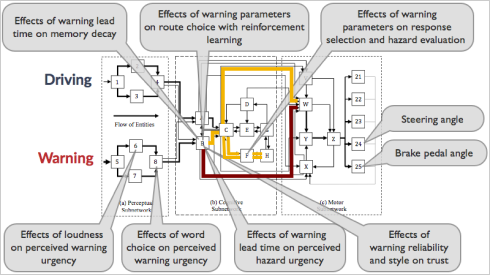Design Projects
Design Overview
Our research interests lie in the area of Human-Technology linteraction and Performance Modeling in CyberTransportation Systems (CTS). With the continued advances in CTS, the communication between vehicles and theincreased automation capabilities aim to support a new generation of safety applicaions and provide information todrivers in a reliable and timely manner. Our current research focuses on the interaction between humans and CTS byproposing a theoretical framework that combines automation and communication technologies, in-vehicle informationsystems (cooperative collision warning systems), and human drivers. We adopt experimental and modelingapproaches to investigate and quantify the effects of system characteristics on human behavior and performance inCTS. This framework aims to (1) provide insights into human cognition mechanisms regarding how humans perceive.process, learn and respond to information: and (2) provide a way to optimize and evaluate the desian of CTS byaddressing human needs.
Ongoing Design Projects
● Enhancing Situation Awareness of Adversary Ml in Human-Al Collaboration for safe mplementation of Automated DrivingSystems
Al systems integrated into automated driving systems (ADS) are susceptilble to adversarial attacks, therebycompromising the safety andsecurity of ADs and posing sianificant risks on the road, potentialv leading to accidentsand fatalities, Drivers often overestimate the Alscapability to detect objects, resulting in a lack of awareness that canbe hazardous, particularly in SAE Level 3 ADs, where drivers areexpected to intervene in automation controls whennecessary
This colaborative proiect with Dr. Aiping Xiong from IST is to develop a comprehensive framework for enhancingcollaboration betweendrivers and Al systems in response to adversarial attacks, with a specific focus on improvingdriver situation awareness. We willassess theinfluence of system capabilities and reliability on various facets,including driver situation awareness, trust in Al sytems, acceptance of Altechnology, and driver performance whenfaced with diverse adversarial attack scenarios.
● Impact of CAV Technologies on Driver Behavior

This project focuses on the predictive understanding of the impacts of connected and autonomous vehicle (CAV)technology on changes in driver behaviors during commute travel. We aim to develop driving simulators to enable liveinteractions with traffic microsimulations of community-level traffic flows. This project seeks to combine the best-practice tools in transportation engineering, human factors, vehicle dynamic simulation, and urban land-use choicesto produce a comprehensive understanding of human-vehicle interaction in CAVs.
● lmpact of CAV Technologies on Driver Behavior

To understand the psychological processes involved in driver information processing and assess driver performance, our third research avenue focuses on developing cognitive driver performance models in CAVs. This research employs the Queueing Network-Model Human Processor (QN-MHP) cognitive framework and mathematical modeling techniques to establish a computational framework for driver-vehicle interaction. It aims to uncover the cognitive processes involved in how drivers process warnings and information from CAVs and predict the impact of HMI designs on driver performance. This research contributes to the computational cognitive modeling field by advancing our comprehension of driver cognitive processes in driver-vehicle interactions and facilitating the design of user-centered interfaces for CAV systems
